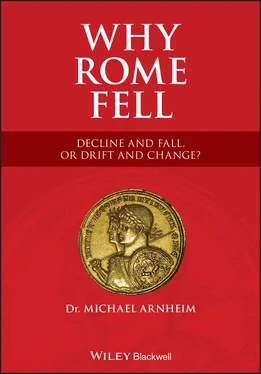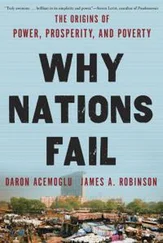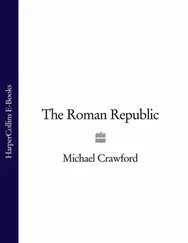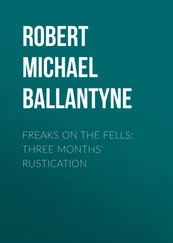Michael Arnheim - Why Rome Fell
Здесь есть возможность читать онлайн «Michael Arnheim - Why Rome Fell» — ознакомительный отрывок электронной книги совершенно бесплатно, а после прочтения отрывка купить полную версию. В некоторых случаях можно слушать аудио, скачать через торрент в формате fb2 и присутствует краткое содержание. Жанр: unrecognised, на английском языке. Описание произведения, (предисловие) а так же отзывы посетителей доступны на портале библиотеки ЛибКат.
- Название:Why Rome Fell
- Автор:
- Жанр:
- Год:неизвестен
- ISBN:нет данных
- Рейтинг книги:3 / 5. Голосов: 1
-
Избранное:Добавить в избранное
- Отзывы:
-
Ваша оценка:
- 60
- 1
- 2
- 3
- 4
- 5
Why Rome Fell: краткое содержание, описание и аннотация
Предлагаем к чтению аннотацию, описание, краткое содержание или предисловие (зависит от того, что написал сам автор книги «Why Rome Fell»). Если вы не нашли необходимую информацию о книге — напишите в комментариях, мы постараемся отыскать её.
Why Rome Fell: Decline and Fall, or Drift and Change?
Why Rome Fell
Why Rome Fell
Why Rome Fell — читать онлайн ознакомительный отрывок
Ниже представлен текст книги, разбитый по страницам. Система сохранения места последней прочитанной страницы, позволяет с удобством читать онлайн бесплатно книгу «Why Rome Fell», без необходимости каждый раз заново искать на чём Вы остановились. Поставьте закладку, и сможете в любой момент перейти на страницу, на которой закончили чтение.
Интервал:
Закладка:
Other magistracies: All other regular executive magistracies, such as the praetorship, aedileship, and quaestorship, were similarly collegiate, being shared by several office-holders at the same time. They were elected for a year at a time and could be re-elected but only after a gap of ten years.
Tribunus plebis (Tribune of the plebs): An important office, traditionally said to have arisen out of the conflict between patricians and plebeians, known as the Conflict or Struggle of the Orders, which ended after about two centuries in 287 BCE. The tribunes, 10 in number after 457 BCE, were elected by the Concilium Plebis, an assembly of all Roman citizens except patricians. Tribunes could convene this body and preside over it. By the third century BCE, the tribunes also had the power to summon the Senate and put proposals to it. Provocatio (appeal against execution or flogging without trial) could be addressed to a tribune, but details are sketchy. A really important power held by tribunes was intercessio, the power to veto the action of any magistrate and even acts of the Senate, but no magistrate could veto the action of a tribune. Coupled with sacrosanctitas, or inviolability of their persons, a breach of which was punishable by death, these powers made tribunes extremely influential. According to persistent tradition, the tribunate was created to protect the original plebeians in the Conflict of the Orders.
These plebeians, or some of them, eventually fused with the patricians to form a composite patricio-plebeian aristocracy. The dating is much disputed, and it appears that it was only in 173 or 172 BCE that both consuls were plebeians for the first time (Cornell 1995, p. 337 f.) However, there is really no need to dismiss Livy’s detailed account. A simple explanation may be that, though it was constitutionally permissible from 342 BCE for both consuls to be plebeians, this law was not acted on until 173 BCE. The Lex Genucia was, after all, according to Livy, purely permissive and not mandatory. In other words, it allowed both consuls to be plebeians but did not require it. What is more significant is that, from 343 BCE onward, one consul was always a plebeian. These plebeians therefore formed an integral part of the senatorial aristocracy or oligarchy. So, who then made up the plebs whom we encounter in political activity in the late Republic, particularly from the time of the Gracchi, two hundred years after the Lex Genucia? Were they simply those plebeians from the early Republic who had been left behind when their more fortunate brethren joined the aristocracy? This seems unlikely as this later plebs, sometimes termed plebs urbana (urban plebs), is often portrayed as a mob, or what Cicero described as faex Romuli (the dregs of Romulus).” (Cicero Ad Att. 2.1.8.) Though created to protect the interests of a very different plebs in the early Republic, the tribunate was used to good effect by demagogues like the Gracchi in the late Republic on behalf of this more desperate plebs. In 48 BCE, tribunicia potestas (tribunician power) was granted to Julius Caesar, who, as a patrician was ineligible to hold the actual tribunate. In 23 BCE, this same power was bestowed by the Senate on Augustus for life, in addition to the sacrosanctitas of a tribune which he already had. Tribunician power was an important signal of the emperor’s identification with the interests of the lower classes, and it was routinely bestowed on every emperor, usually upon his accession.
Censor: A very senior post in charge of taking the census of citizen numbers, open only to former consuls, again shared by two equal office-holders, elected originally for five years but later for eighteen months.
Senate: This was the most important deliberative body under the Republic, made up of former holders of the different executive magistracies. Until the passing of the Ovinian Law (Lex Ovinia) in 318 BCE, senators were appointed by the consuls and, after that date, by the censors. Under Sulla’s reforms of 81 BCE, quaestors were granted automatic membership of the Senate. Consuls were invariably drawn from the ranks of the Senate.
Assemblies: Roman citizens were members of several Assemblies, arranged in slightly different ways: the Comitia Curiata, Comitia Centuriata, and Comitia Tributa. It was the Centuriata alone, in which the citizens were arranged along military lines, that had the power to declare war and to elect the highest-ranking magistrates, the consuls, praetors, and censors. Until 241 BCE, the Centuriata was effectively controlled by the aristocracy. It was then reorganised on more egalitarian lines, but subsequently reverted to the older arrangement. However, the Roman Republic never claimed to be a democracy, and the consuls, praetors, and censors were always chosen from the ranks of senators, regardless of the arrangement of the assembly. Besides these assemblies, there was the Concilium Plebis, which appears to have had the same arrangement and membership as the Comitia Tributa, with the exclusion of patricians.
Dictator: The only exception to the rule of shared power was the appointment of a dictator in an emergency, which was strictly limited to a tenure of six months. The Senate had to pass a decree (senatus consultum) instructing the consuls to nominate a dictator. The dictator would then appoint a magister equitum (master of the horse) to assist him and act as his deputy when necessary. Once appointed, the dictator had absolute power over the Roman state, superseding that of the consuls. The most admired type of Republican hero was someone like Cincinnatus, who, after resolving the immediate emergency in a fortnight, at once gave up his dictatorship and returned to his plough and to obscurity. The reason that Cincinnatus was fêted as an ideal Republican was that he had no interest in gaining personal power. After 202 BCE, the Senate would issue an emergency decree, labeled by modern historians senatus consultum ultimum, instead of appointing a dictator. The dictatorship was only revived much later on, in 82 BCE, first for L. Cornelius Sulla and then again for Julius Caesar in 46 BCE but, so far from preventing one-man rule, it was now used as a vehicle to achieve just that: bringing down the Republic.
“In the Consulship of Julius and Caesar”
A visceral fear of one-man rule is characteristic of oligarchies and aristocracies, not least in the case of the Roman Republic, where, as mentioned above, this fear was stemmed by collegiality and rotation of office. However, a less than persuasive argument is put forward against this view by Lintott, who opines that, “We would be wrong…to see collegiality in principle as a form of constitutional check: the multiplicity of magistrates was perhaps in origin intended rather as cover for a multiplicity of functions and insurance against the sudden death or disability of a magistrate.” (Lintott, loc 1250.) The key word here is “perhaps.” The only evidence for this view is that “…we find the praetors and quaestors generally each having separate functions, although the treasury came to be entrusted to a pair of quaestors, and the aediles, curule and plebeian, worked in pairs in the administration of the games” (Ibid.). A key fact is that the consuls, who did not have “separate functions,” had a veto power over each other. And, besides the power of the holder of a higher magistracy to forbid a lower magistrate from acting in a certain way, a magistrate could use the power of intercessio , as it was called, to cancel a colleague’s action after it had occurred by acting in a contrary sense. But Lintott is anxious to wave this aside as well: “Where we find magistrates, other than tribunes, actually obstructing their colleagues in the late Republic, it is by exploiting their power of consulting the auspices in order to detect unfavourable religious omens” (Ibid.). This use of the auspices to block a colleague’s actions was a well-known political ploy which only confirms its function as an attempt to prevent an individual from becoming too powerful. An extreme example of this (not mentioned by Lintott) was the attempt in 59 BCE by Julius Caesar’s conservative co-consul, Marcus Calpurnius Bibulus, to block Caesar’s populist legislation by closeting himself at home and issuing proclamations announcing bad omens, of which no proof was required. (Suetonius, Julius, 20.1.) As a result, Bibulus was sidelined, and some jokers signed mock-formal documents dated “Done in the consulship of Julius and Caesar” instead of “Bibulus and Caesar.” (Ibid. 20.2.)
Читать дальшеИнтервал:
Закладка:
Похожие книги на «Why Rome Fell»
Представляем Вашему вниманию похожие книги на «Why Rome Fell» списком для выбора. Мы отобрали схожую по названию и смыслу литературу в надежде предоставить читателям больше вариантов отыскать новые, интересные, ещё непрочитанные произведения.
Обсуждение, отзывы о книге «Why Rome Fell» и просто собственные мнения читателей. Оставьте ваши комментарии, напишите, что Вы думаете о произведении, его смысле или главных героях. Укажите что конкретно понравилось, а что нет, и почему Вы так считаете.












